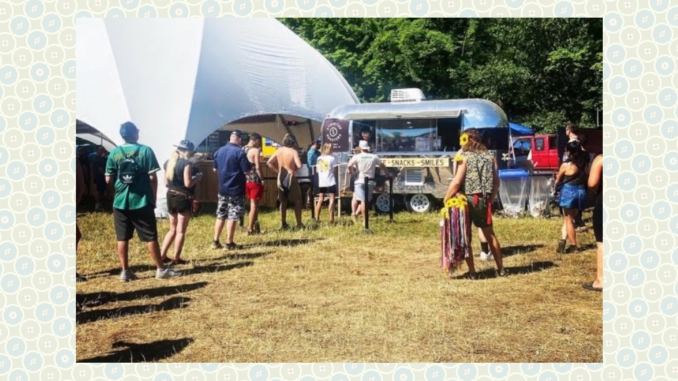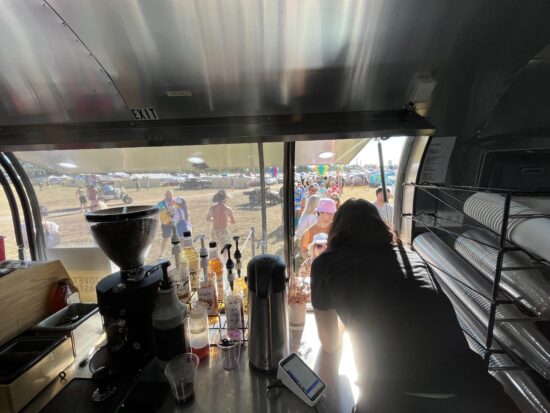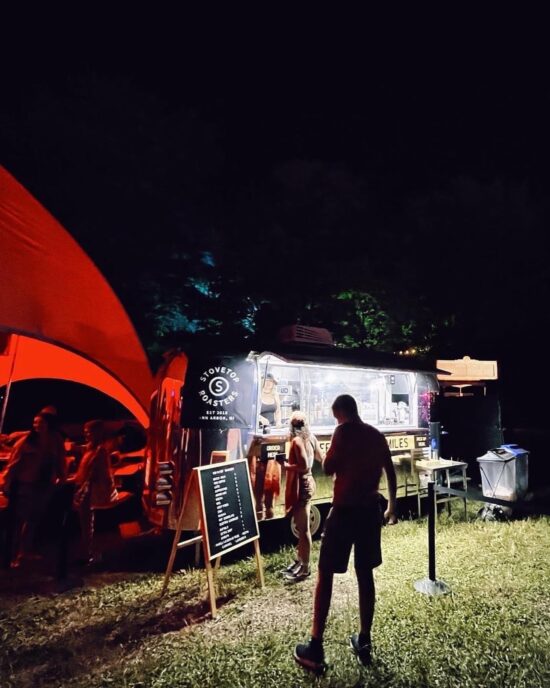
These five tips will help you score big with large-scale events.
BY JOSH TAVES
BARISTA MAGAZINE
Photos by Alex and Lydia Bolen
Where do I start … my head is still spinning a bit.
Here’s the deal: I work for a small roaster/retailer with about a dozen employees total, one café, and one roastery. We run a wholesale roastery with a Diedrich IR-12. Our maximum roasting batch size is somewhere around 18 pounds. We recently spent a week as the official coffee sponsor for a large event called the Electric Forest Festival in Michigan. When I say large, I mean somewhere around 65,000 people. And no, I didn’t add an extra zero. By the time the week was over and the chips had fallen, we had done roughly six weeks’ worth of normal business revenue in about five days.
Without getting too bogged down in the details, we made over 130 gallons of cold brew, 33+ gallons worth of lattes, 50-ish gallons of hot coffee, and a whole bunch of teas, chais, and matchas on site—hot and iced, and all in the middle of a dirt parking lot. None of it was made ahead of time, and none of it sat at room temperature, and all of it was delicious. And did I mention that we supplied several thousand pounds of roasted coffee to dozens of other vendors on site as well?

How did we do it? While the answer to that question is too complex and long to answer here, I will say that it was a feat for sure, and many lessons were learned along the way. Reflecting back, it’s clear that what mattered more than capability was attitude and perspective. Here are a few of those key takeaways that you can use to help push your business along in large-scale events, even if your business is small-scale.
Tip 1: Trust Your Team
I believe the most important tool for success in any business situation is trusting in a solid group of folks who can help you reach your collective goals. This is especially true when executing very large sales such as this. Being open and honest with your co-workers who are going to be fighting in the trenches with you allows everyone to perform to their greatest potential because they know that if they need to tap out or get overwhelmed, everyone else has their back. This will take some vulnerability on the parts of everyone involved (especially leadership, which might mean you), and respect from others when that vulnerability is shared. In the end, you all have a collective goal, and it’s going to be hard to reach that goal, but you’re all in this together!
Tip 2: Don’t Say No
I can tell you from experience that one of the biggest hurdles for managers of big events like this is that many small local vendors tell them “no.” Local breweries can’t deliver 10,000 cans of their top-selling beer at once on the fly, and mom-and-pop pizza places aren’t set up to serve 100,000 slices in a weekend either (not an exaggeration, we were set up next to a pizza stand)—at least, not without careful, considered planning. While large-event managers may want support from the small, local favorites, they often can’t get it because the little guys sometimes have trouble wrapping their heads around a volume so vastly different from what they’re used to.
So my advice is this: Rather than saying “no,” push yourself to solve the issues you might initially see as problems or view as impossible. When we originally were asked to provide a sales pitch to the Electric Forest team, they wanted to know if we could deliver 3,500+ pounds of roasted coffee. At that moment, could we? Absolutely not. However, with a trusted team and a problem-solving mentality—not to mention three months to solve those problems in advance—we did! Think of it this way: Why not buy $10,000 of new equipment if it helps you make $30,000? Why not hire 10 new folks if it helps you get your brand in front of thousands? Large events want local vendors; do you want to work with them? They want you to make money, so do you want to put in the work to do that?
Tip 3: Interpret the Needs
Part of problem solving and landing big sales is interpreting the needs of the customer. As a high-quality café or roastery, you’re probably used to delivering high-quality, small-batch single-origin coffees with a top-shelf level of tasting notes and information. Is that what your festival customer wants? Maybe—or perhaps what they actually want is access to your amazing brand and your renowned customer service. Perhaps they’re tired of offering lukewarm pre-ground Folgers or Sysco coffee at their event and want something better. An event with 65,000 attendees sounds a lot more doable when the goal is smiling faces and coffee with moderate sweetness and a lack of bitterness, doesn’t it? To bring my point back around, I have found that listening to a customer and actually trying to interpret their desires, coupled with a willingness to meet those desires in an efficient way, and an ability to hold your pride loosely, leads to many open doors and opportunities that would otherwise be missed.

Tip 4: Don’t Go It Alone
OK, so you’ve approached your festival customer with an open mind, you’ve listened to their needs, and you’re working hard to solve these new problems—but some issues still seem insurmountable. As coffee-industry professionals, we are typically able to build a big network of local business owners, friends, and family who all want to see us reach our coffee goals. Who among them can help you? If this turns up some dead ends, independent contractors abound if you choose to look. Perhaps there’s another coffee roaster nearby who could lend a hand with the production for a reasonable fee, and maybe they also have some equipment you could borrow? In our modern era, you can rent storage facilities, delivery vehicles (and drivers), and even espresso machines in many markets. As long as the money you make is more than the rental fees (it will be), you win! Use the network around you for the success of everyone involved, and you’ll be able to include so many folks in your awesome sense of accomplishment!
Tip 5: Lastly, Be Honest
Remember when I said that we couldn’t fulfill the initial ask in our first meeting with the event management? I didn’t keep that a secret, so they knew that from day one. Being honest about your abilities and shortcomings shows vulnerability (see the first tip above) and invites your customers to be a part of your team, not to mention your success when you do overcome your hurdles. In the end we won the contract because of our willingness to solve problems, the network that we were able to utilize, and the fact that we listened to the festival team’s needs and sought to solve them. Any time we came upon another set of problems, the event management knew it, and we shared not only our faults, but our solutions and successes.
Ready to try your luck at catering large events? Go for it! You’ll be surprised at how far these five principles and a bit of confidence in yourself will get you.
ABOUT THE AUTHOR
Josh Taves is a contributor to Barista Magazine and is the head of business development for Stovetop Roasters in Michigan and the creator of CuppingBrewer.com. He is also a 2017 USBC finalist, so he knows his way around lots of different coffee gadgets. He’s been working in the coffee industry since 2006 and enjoys taking advantage of all the great adventures the outdoors has to offer.

